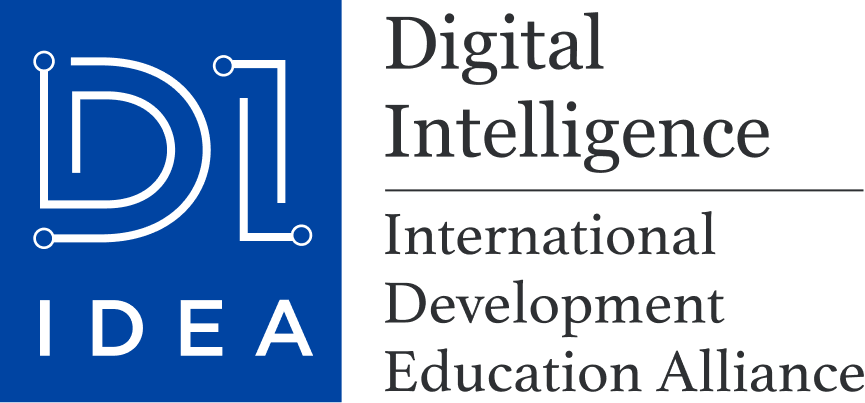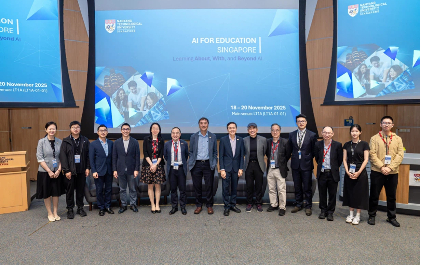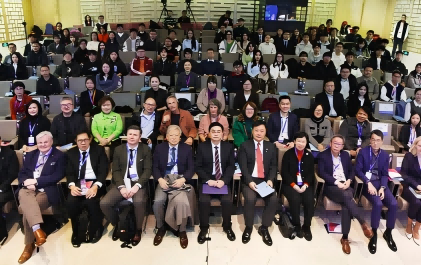On the morning of May 16th, an international academic conference titled "Technology and the Emerging Social Contract for Education" was held at the University of Cambridge. The event was jointly organized by Peking University and the Digital Education Futures Initiative (DEFI) at Hughes Hall, University of Cambridge, both members of the Digital Intelligence International Development Education Alliance (DI-IDEA). The theme of the conference was derived from the report "Reimagining our futures together: a new social contract for education" published by UNESCO, which focuses on key issues of global educational transformation. Over 100 experts and scholars from countries including China, the United Kingdom, Switzerland, Australia, Singapore, and Ghana participated in the conference.
Sun Hua, Director of the Office of the Provost and the Center for Excellent Teaching and Learning at Peking University, and Secretary-General of DI-IDEA, and Kevin Martin, Managing Director of DEFI at University of Cambridge, delivered opening remarks. Sun Hua reviewed the series of collaborations between Peking University and University of Cambridge, noting that the conference established a cross-institutional dialogue mechanism and expressed his hope for continued in-depth cooperation between the two institutions. He shared the Alliance's 2025 plan, which includes seven international academic conferences and four major projects: "Faculty AI Literacy Enhancement Program," "Ethical Boundaries in AI-Powered Pedagogy Research," "Digital Intelligence Education Framework," and "Digital Intelligence Education Resource Sharing." Sun Hua also invited experts and scholars from various fields present at the conference to attend the 2025 Beijing Forum. Kevin Martin pointed out that the conference aimed to explore how technology shapes the emerging social contract for education, advocating for imagination, critical thinking, and dialogue as core methods. He encouraged participants to think and collaborate together to promote educational equity, inclusiveness, and innovation, and to seek sustainable solutions to current and future educational challenges.
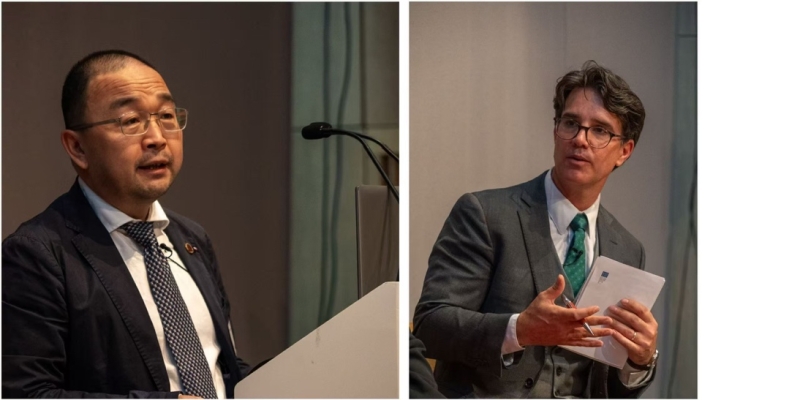
Sun Hua and Kevin Martin delivered speeches
During the keynote speech session, Sobhi Tawil, Director of Future of Learning and Innovation at UNESCO, noted that artificial intelligence is disrupting traditional educational models, forcing society to re-examine the purpose of education and reshape the social contract for education. He emphasized the need to center human agency, ensuring that technology serves the public interest rather than being dominated by private interests or algorithms. He called for global collaboration and a framework of public responsibility (such as UNESCO's initiatives) to balance innovation with ethics, and to drive education towards a transformation for the common good, in order to address the uncertainties and risks brought by technology. Dr. Catherine Appiah-Pinkrah from the Ghanaian Ministry of Education, in her speech titled "Redefining Education for a Technology-Enabled Society," pointed out that the current education system, especially in Africa, urgently needs to shift from the traditional state-driven standardized model to a new social contract that is inclusive and collaborative. Using Ghana as an example, she proposed reshaping education through equity-driven policies (such as digital literacy programs, free education, and teacher training) and strategies that combine technology with humanities to cultivate future skills. She also called for global collaboration to ensure that technology serves the public interest rather than exacerbating divisions. Professor Rupert Wegerif from the University of Cambridge argued that education should return to its essence of cultivating critical thinking and dialogical skills. He proposed the creation of a "dual dialogue" teaching system, where Socratic teacher-student dialogue solidifies the foundation of critical thinking, and AI acts as a knowledge collaboration partner to expand the boundaries of innovation. He emphasized breaking down the opposition between technology and the humanities, positioning AI as a tool for extending thinking—both for addressing global challenges such as environmental crises and for establishing dual safeguards: constraining algorithmic applications through ethical frameworks and maintaining human value judgment advantages in complex decision-making through dialogical education, in order to uphold human civilization's dominant role in the intelligent age. Tshilidzi Marwala, Rector of the United Nations University and Under-Secretary-General of the United Nations, believed that education should be an ecosystem that is dynamically coordinated with society, and that technologies such as artificial intelligence should be used as auxiliary tools to enhance, rather than replace, human values—both to promote teaching innovation and global connectivity and to establish ethical frameworks to safeguard cultural diversity and the digital rights of vulnerable groups. The core of education lies in shaping citizens with empathy and a sense of social responsibility; the integration of technology must serve to maintain the social contract of educational equity and the transmission of knowledge across generations, rather than exacerbating resource gaps or diminishing human agency.

From left to right are: Sobhi Tawil, Catherine Appiah-Pinkrah, Rupert Wegerif, and Tshilidzi Marwala
In the afternoon, industry experts from companies such as China's EEO Education Technology Co., Ltd., Cambridge Innovation Labs in the UK, and Mercor in Silicon Valley, USA, shared their technological explorations in the field of artificial intelligence and practical applications in empowering classroom teaching. Professor Ma Yinghua from Peking University introduced the African Girls’ Project under Sino-African cooperation, which significantly reduced dropout rates and enhanced school safety through sexual education courses and hygiene management reforms in countries like Nigeria and Uganda. Dr. Ian Steed from the Geneva Foundation proposed using digital technology to build a learning network for health workers to strengthen the trust mechanism for immunization in marginalized communities. Dr. Hafsah Mohammed from the Center for Open Education Research showcased climate-smart classroom renovations, AI temperature prediction models, and evidence-based platforms to support the resilience-building of education systems in developing countries. Dr. Imogen Casebourne from Cambridge Innovation Labs explored how AI can empower collective wisdom to address global challenges through dialogue data analysis and collaborative task design.
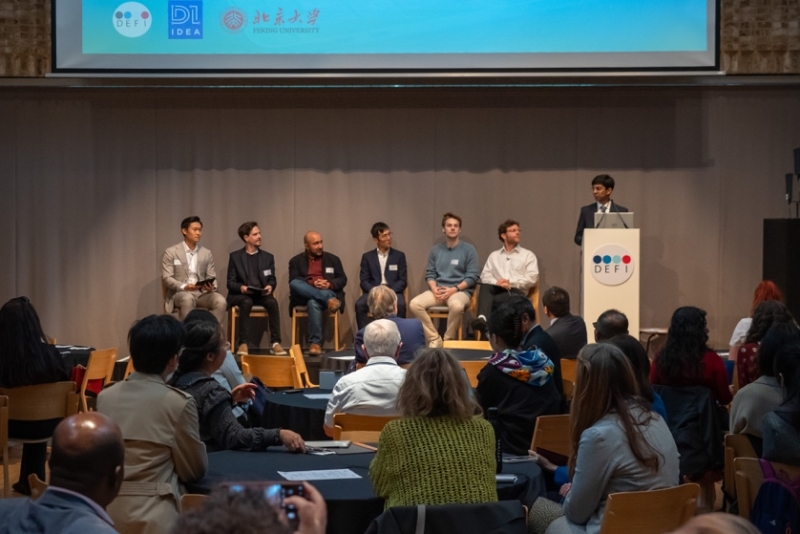
Presentation of AI project
The conference concluded with a collective workshop, where participants were divided into 10 groups under the guidance of experts from UNESCO and the University of Cambridge to depict four scenarios of future education: whether schools will shift to ability-based streaming, whether emotional intelligence robots can replace teachers, whether climate change will impact the development of educational AI, and whether artificial intelligence will revolutionize or terminate traditional school education. Scholars discussed these topics, shared their insights on technology for good and the sustainable development of education, and reached a consensus on further cooperation and co-construction among universities, enterprises, and institutions.
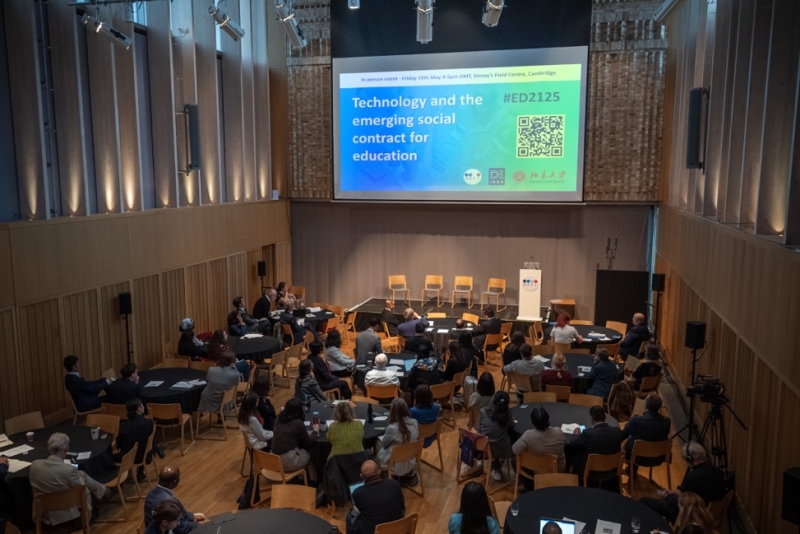
Conference site
This conference is one of the DI-IDEA 2025 series of academic conferences. Subsequently, DI-IDEA will collaborate with the University of Cambridge and international organizations such as UNESCO to conduct research on the social contract for education. This demonstrates Peking University's pragmatic approach to promoting global educational innovation by building a multilateral cooperation platform in the context of AI-driven educational transformation.
